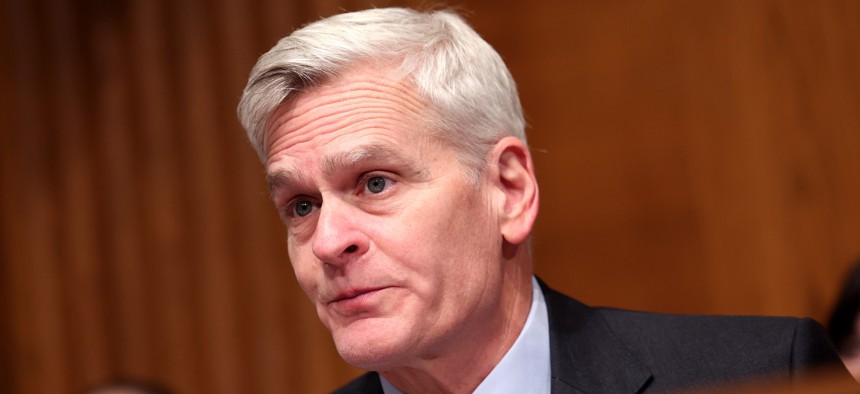Vet centers need better systems, data to enhance support services

Sen. Bill Cassidy, R-La., plans to introduce legislation to create help Congress better understand how the VA is addressing mental health and suicide prevention. Kevin Dietsch/Getty Images
Watchdog officials warned lawmakers that the community-based counseling centers for returning veterans use a platform for identifying those at high risk of suicide that is “neither effectively nor consistently utilized.”
The Department of Veterans Affairs’ community-based counseling centers — known as vet centers — provide critical mental health services to help veterans readjust to civilian life, but those centers still struggle with deficiencies in key systems and a lack of access to needed data that hamper their oversight and outreach efforts, according to watchdog officials.
During a Senate Veterans’ Affairs Committee hearing on Wednesday, representatives from the Government Accountability Office and the VA Office of Inspector General warned that the Veterans Health Administration-overseen vet centers are not complying with required procedures and have not fully addressed previously identified oversight concerns.
In her written testimony submitted to the committee, Julie Kroviak — principal deputy assistant inspector general in VA OIG’s office of healthcare inspections — noted that these centers focus, in large part, “on interventions for psychological and psychosocial readjustment problems when transitioning to civilian life that are related to various types of military service and deployment stressors, such as combat-related trauma and [military sexual trauma].”
She told lawmakers that OIG — which has been conducting ongoing reviews of vet centers as part of an inspection program first initiated in 2020 — has repeatedly found evidence “of noncompliance with many required processes, most notably those for assessing and documenting a veteran’s suicide risk.”
This has included failures in oversight of staff training and supervision of center personnel, as well as a lack of clear policies and procedures for supporting veterans at risk of self-harm.
Kroviak noted, for instance, that VHA’s Readjustment Counseling Service — which oversees the vet centers — created a “high risk for suicide flag SharePoint site in May 2020 to easily identify and anticipate the needs of vet center clients identified as high risk or potentially high risk for suicide by the VHA medical facility.” But she said interviews with frontline staff showed that the platform is “neither effectively nor consistently utilized.”
“As many staff report, they were never informed on the purpose, they’re perplexed by the inefficiencies and multiple steps to enter basic information and [are] repeatedly misinformed by the site’s inaccurate information,” she added.
Additionally, Kroviak told lawmakers that frontline staff “have repeatedly shared their concerns and frustrations with the limited functionality of the vet centers’ electronic recordkeeping system, known as RCSNet.”
“A modern and efficient electronic recordkeeping system is critical to ensure that required collaboration, coordination and quality oversight activities not only occur timely, but also meet quality standards,” Kroviak added.
She said, however, that ongoing issues with VA’s broader rollout of its new Oracle Cerner electronic health record system — which is currently paused to address deployment challenges — mean that “when and whether vet centers will have the opportunity to modernize their system remains unclear.”
Sharon Silas — director of GAO’s health care team — also told lawmakers that vet centers “use some data to tailor outreach activities, such as census data,” to better identify transitioning service members for outreach. But she said the centers “could benefit from guidance that include metrics and targets for assessing the effectiveness of these outreach activities.”
Silas said in written testimony that VHA is working with VA’s Office of Information and Technology to “develop a software solution to access the Veterans Affairs/Department of Defense Identity Repository, which contains the demographic information on veterans who recently transitioned from active service by zip code.” VHA officials said they are planning to implement the software solution in March 2024.
Sen. Bill Cassidy, R-La., noted during the hearing that “in the past year, nearly 250,000 veterans, service members and their families were able to receive counseling at VA’s over 300 vet centers around the nation.”
He added, however, that unease about how “vet centers interact with the rest of the VHA ecosystem” has pushed him to plan legislation “that would create an organization, called VetPAC, that would help Congress better understand how the VA is addressing issues like mental health and suicide prevention in a more holistic manner.”
VA officials have been experimenting with using artificial intelligence and natural language processing to better identify veterans at risk of suicide, although some lawmakers have voiced concerns about the disclosure and oversight processes involved in those nascent efforts.






